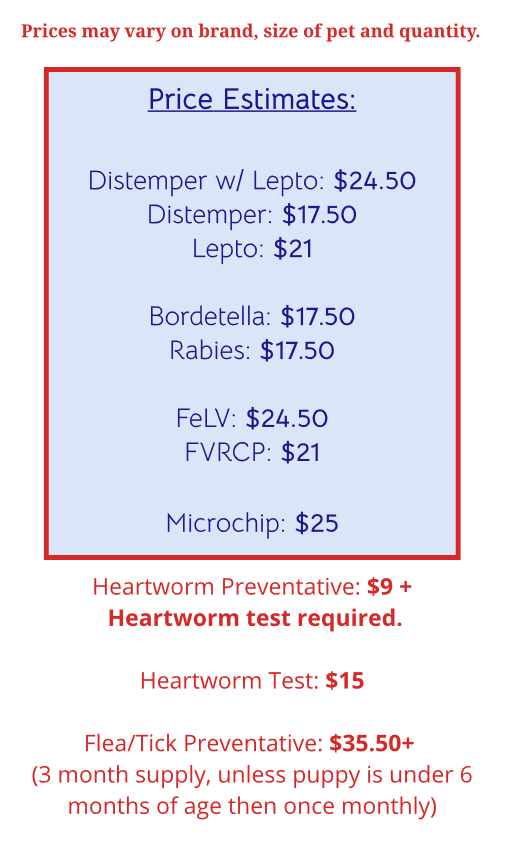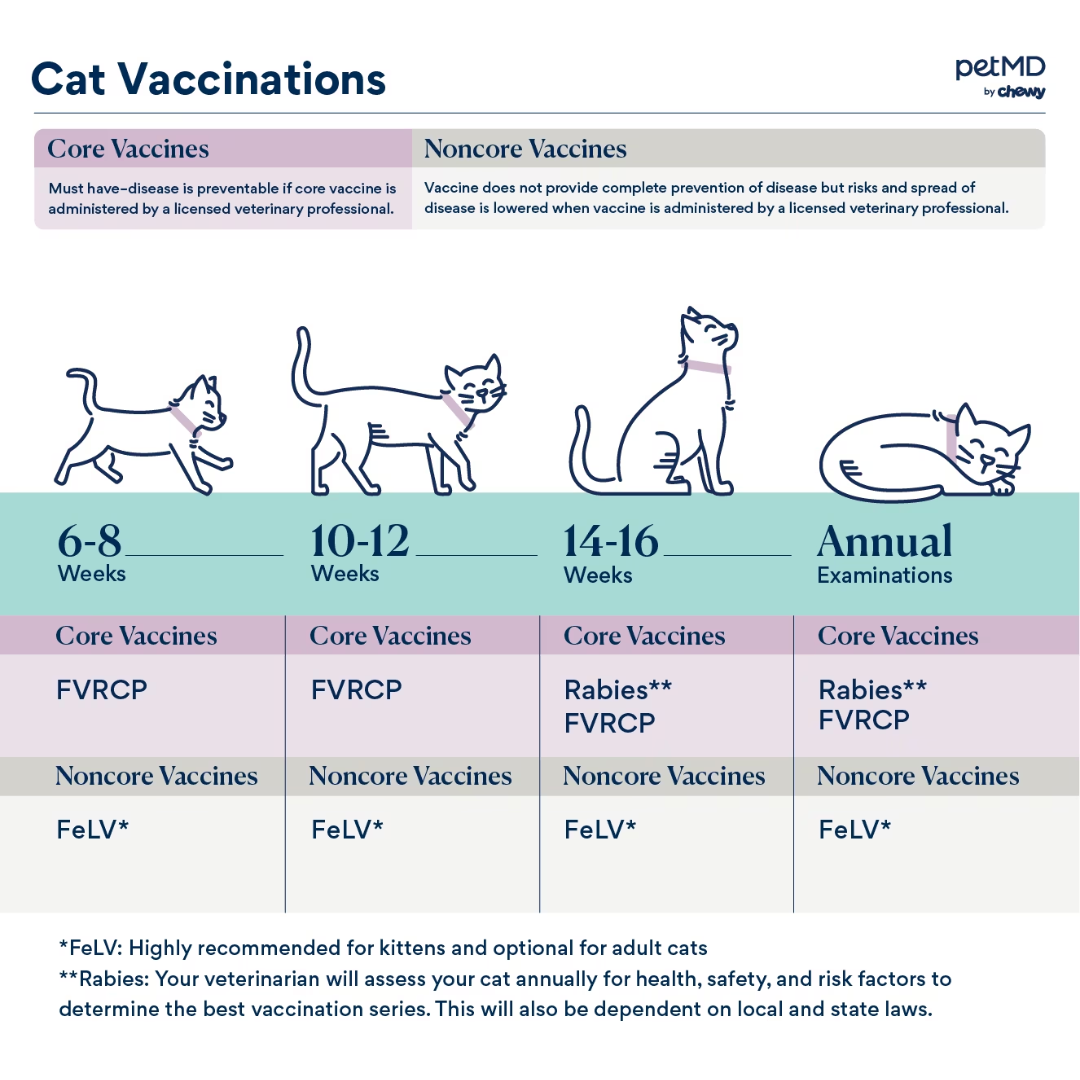Distemper, Adenovirus, Parainfluenza, and Canine Parvovirus (DAPP) Vaccine: DAPP stands for 4 viruses that together make up the most deadly diseases in dogs and puppies. These viruses attack the brain, intestines, liver, kidney, eyes, and lungs. Fortunately, they can be prevented by vaccination and limiting your puppy’s exposure until they’re immune systems are fully activated (2 weeks after their last vaccine at or around 16 weeks of age).
This vaccine is recommended starting at 6-8 weeks old and repeated every 4-6 weeks until the puppy 16 weeks for a minimum of 3 vaccines, sometimes 4. For puppies and dogs over 16 weeks old who have not been vaccinated before, 2 vaccines are needed for protection 2-4 weeks apart. This vaccine is repeated within one year, and then every 3 years for life. This is a core vaccine.
Lepto Vaccine: Leptospirosis is an infectious disease that attacks the kidneys and liver and is caused by a spiral shaped bacteria called Leptospira. This bacteria can be spread to people as well. The most common way dogs get leptospirosis is through water contaminated with urine, particularly stagnant or slow-moving water like puddles, ponds or lakes.
This is a non-core vaccine. The first time it is given or if it has been over 15 months since the last vaccine it will need to be boostered in 2-4 weeks and then repeated every year.
Bordetella Vaccine: This vaccine helps your dog’s immune system protect them from a bacteria called Bordetella bronchiseptica. This bacteria causes Canine Tracheobronchitis (Canine Cough) A highly contagious infectious disease of the upper respiratory tract of the dog, canine cough is spread through coughing and sneezing.
This is a non-core vaccine and is recommended every year, although some boarding facilities may require it every 6 months.
Vaccines for Cats Only
FVRCP feline panleukopenia virus, feline herpesvirus 1, and calicivirus
FVRCP stands for3 viruses that together make up the most deadly diseases in cats and kittens. These viruses attack the immune system, brain, intestines, eyes, and lungs. Fortunately, they can be prevented by vaccination and limiting your kittens’s exposure until they’re immune systems are fully activated (2 weeks after their last vaccine at or around 16 weeks of age).
This vaccine is recommended starting at 6-8 weeks old and repeated every 4-6 weeks until the kitten 16-18 weeks for a minimum of 3 vaccines, sometimes 4. For kittens and cats over 16 weeks old who have not been vaccinated before, 2 vaccines are needed for protection 2-4 weeks apart. This vaccine is repeated within one year, and then every 3 years for life. This is a core vaccine.
FeLV stands for Feline Leukemia Virus, a viral infection that affects cats immune systems and bone marrow. It is spread between cat to cat by contact such as saliva, grooming, sharing food bowls, and fighting. It can also be passed from mom to kitten by the placenta. Cats with this disease have weaker immune systems and are more susceptible to upper respiratory infections, dental infections, and various cancers including lymphoma. There is no cure for FeLV. Cats at greatest risk of FeLV infection are those that may be exposed to infected cats, either via prolonged close contact or through bite wounds. Such cats include cats living with infected cats or with cats of unknown infection status, cats allowed outdoors unsupervised where they may be bitten by an infected cat, and kittens born to infected mothers. Though any cat exposed to the virus can develop an FeLV infection, kittens are at a greater risk than adult cats due to their immature immune system. This vaccine is recommended for all cats that go outside, and also recommended for the first 3-4 years for indoor cats as well.
Cats need an FeLV/FIV test before receiving the vaccine, to ensure they do not already have the virus.
This vaccine is recommended starting at 12-16 weeks old, and repeated once 2-4 weeks after the first vaccine. The vaccine is then repeated once yearly for life for outdoor cats, and for the first 3-4 years for indoor cats. Testing is recommended yearly.
Parasites
There are three main places parasites can infect your pet and threaten its health: the intestines, blood, and skin. The good news is they are all preventable!
Intestinal Parasites
There are several types of intestinal parasites that cause problems in dogs and cats. These include roundworms (Toxocara cati, Toxascaris leonine), tapeworms (Dipylidium caninum, Taenia species, and Echinococcus species), hookworms (Ancylostoma), and whipworms (Trichuris vulpis). Additional parasites such as Giardia and Coccidia can also cause intestinal disease in pets. Intestinal worms can be a serious problem in young animals, almost all puppies and kittens have at least one kind of intestinal parasite and up to 80% of adult dogs have intestinal parasites.
Treatment & Prevention for Intestinal Parasites
Pyrantel is a safe, effective, and cost-efficient way to treat and prevent most intestinal parasites. Puppies and kittens need an oral dose every 2 weeks starting at 4 weeks of age or as soon as possible and continuing until 18 weeks of age.
Not all parasites are prevented by pyrantel which is why monthly heartworm prevention is recommended for the additional intestinal parasite coverage in dogs. A once-a-month deworming pill is recommended year-round for life.
Blood Parasites
Heartworms are spread by mosquitoes. A mosquito, when feeding on a dog or cat, may inject heartworm larvae into the bloodstream. These larvae mature and ultimately travel to the heart, residing in the major vessels of the heart and lungs, they can cause congestive heart failure and death if left untreated in dogs. Cats will typically clear the infection on their own but can suffer severe lung disease. Typical clinical signs of heartworm infection range from nothing to fatigue, coughing, and poor physical condition. Adult heartworms are large, reaching 6″ to 14″ (15-36 cm) long.
Detecting Heartworm Infections
Because heartworms take 6 months to mature in adults that can be detected and the early stages of heartworm larvae are killed by monthly heartworm deworming pills, puppies do not need to be tested until they are over 6 months months old. For adult dogs, a blood test is needed to determine if there are adult heartworms present that require more intensive treatment. This test is recommended yearly. For dogs not on prevention, an additional test in 6 months is recommended.
Treating and Preventing Heartworm Infections
Heartworm infections are much easier to prevent than to treat. A safe, cheap preventive is a once-monthly flavored, chewable, pill. It should be given every 30 days, year-round, for life. Because the pills are based on weight, puppies are weighed every month until they reach their adult weight at which time the pills can be purchased for the entire year. The pills only kill the early larval stages, which is why it must be given year-round. The bonus is that the once-monthly deworming pills also prevent intestinal parasites. Once yearly testing is recommended.
Topical Parasites
Fleas, ticks, and mites are more common in young animals, but adults are frequently affected too. Fleas suck blood and can carry several diseases, including plague, and they act as hosts for one of the most common tapeworms of the dog and cat. They are one of the most common reasons for skin issues in dogs and cats as well. Ticks carry germs that cause joint, blood, kidney, and eye diseases and are becoming more common. Mites are microscopic parasites and are especially problematic in puppies kittens. They can cause ear infections, mange and scabies. They can cause severe hair loss and skin disease or intense itchiness.
Prevention and treatment
Year-round prevention of topical parasites is recommended by parasite experts because of the changing and expanding range of parasites and the severity of the diseases they cause. At a minimum, prevention is strongly recommended Spring through Fall. Many of the over-the-counter products are ineffective or unsafe.
These are the most important infectious and parasitic diseases to prevent to help keep your pet as healthy as possible. In addition to vaccines and parasite prevention, we recommend scheduling a wellness exam to discuss oral health, joint health, behavioral health, and weight/nutritional health with our veterinary team. These are not discussed during the vaccine clinic and no exam is performed.
If you would like to schedule a wellness exam, please text us at 720-923-8709



